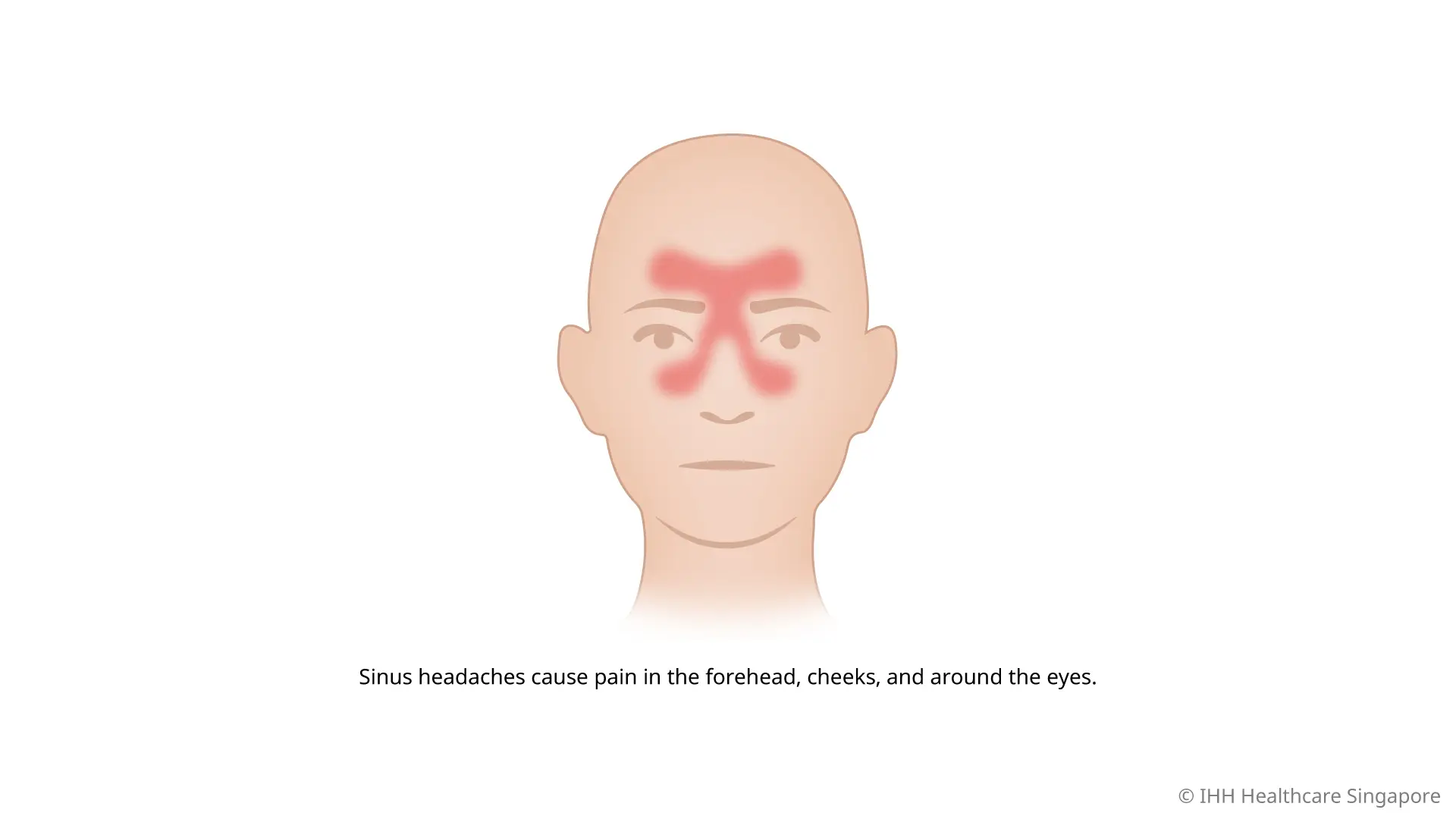-
-
Featured Care Areas

Sinus Headache
What is a sinus headache?
A sinus headache is a type of headache that occurs when the sinuses—air-filled cavities in the skull—become inflamed or congested. This condition is often associated with sinusitis, which is the inflammation of the sinus lining due to infection or allergies.
Pain is typically experienced in the forehead, cheeks, and around the eyes, and may be accompanied by other symptoms related to sinus issues.
What are the types of sinus headaches?
Sinus headaches can be categorised into two main types:
- Acute sinus headaches. These arise suddenly, often due to a respiratory infection, cold, or allergic reaction, and usually resolve as the underlying cause improves.
- Chronic sinus headaches. These are recurrent and can last for extended periods, often resulting from ongoing sinusitis or other persistent sinus problems.
What is the difference between a sinus headache and a migraine?
While both sinus headaches and migraines can cause significant pain, they differ in several ways:
- Location of pain. Sinus headaches typically cause pain in the forehead, cheeks, and around the eyes, while migraines often affect one side of the head and can include throbbing pain.
- Accompanying symptoms. Migraines are often associated with nausea, vomiting, and sensitivity to light or sound, whereas sinus headaches are more likely to be accompanied by nasal congestion and facial pressure.
- Triggers. Migraines may be triggered by stress, certain foods, or hormonal changes, whereas sinus headaches are usually linked to sinus infections or allergies.
Understanding these differences can aid in proper diagnosis and treatment.
What are the symptoms of a sinus headache?
Common symptoms of a sinus headache include:
- Pressure or pain in the forehead, cheeks, or around the eyes
- Nasal congestion or a blocked nose
- Tenderness or swelling in the face
- Post-nasal drip, leading to a sore throat
- Fatigue and a general sense of malaise
- Sometimes, a fever or a feeling of fullness in the ears
These symptoms can mimic those of other types of headaches, making it important to identify the underlying cause.
When to seek medical attention?
You should seek medical attention if:
- The headache persists despite using over-the-counter pain relief
- You experience severe pain that is worsening or different from your usual headaches
- There are sudden changes in vision or facial swelling
- You develop a high fever or signs of a more serious infection that do not improve
It’s important to have a healthcare professional evaluate these symptoms to prevent complications.
When to visit urgent care?
Consider visiting an urgent care centre if you experience:
- A sudden, severe headache that feels different from any you’ve had before
- Symptoms suggestive of a serious condition, such as confusion, difficulty speaking, or sudden weakness
- Intense facial pain or swelling
- Symptoms of a respiratory infection that are rapidly worsening
These signs may require immediate evaluation and treatment.
What causes a sinus headache?
Sinus headaches are often caused by:
- Sinusitis. An infection or inflammation of the sinuses, typically due to a viral infection following a cold.
- Allergic reactions. Exposure to allergens such as pollen, dust mites, or pet dander can trigger sinus inflammation.
- Environmental factors. Changes in weather, pollution, or irritants like smoke can exacerbate sinus issues.
- Structural abnormalities. Conditions such as nasal polyps or a deviated septum can impede normal sinus drainage.
Identifying the cause is essential for effective management.
What are the complications of a sinus headache?
While sinus headaches themselves are generally not serious, untreated or chronic sinusitis can lead to complications such as:
- Chronic sinusitis, which may require more intensive treatment.
- Ear infections due to congestion.
- Meningitis, as a result of sinus infections spreading to the brain, leading to serious conditions.
- Orbital cellulitis, as a result of the infection spreading to the eye area, potentially resulting in vision issues.
Timely treatment can help prevent these complications.
How do you prevent a sinus headache?
Preventative strategies include:
- Identify and reduce exposure to known allergens.
- Adequate fluid intake to help keep mucus thin and promote drainage.
- Using a humidifier to alleviate sinus congestion, particularly in dry environments.
- Regular handwashing can help prevent infections that lead to sinus issues.
Incorporating these habits can significantly reduce the frequency of sinus headaches.
This coverage checker is brought to you by Health Insured, an online resource that helps you understand your health coverage in Singapore.
This page has been reviewed by our medical content reviewers.
Need help?
For enquiries, please call
+65 6377 3737
For appointment bookings, please WhatsApp
+65 8111 3777









